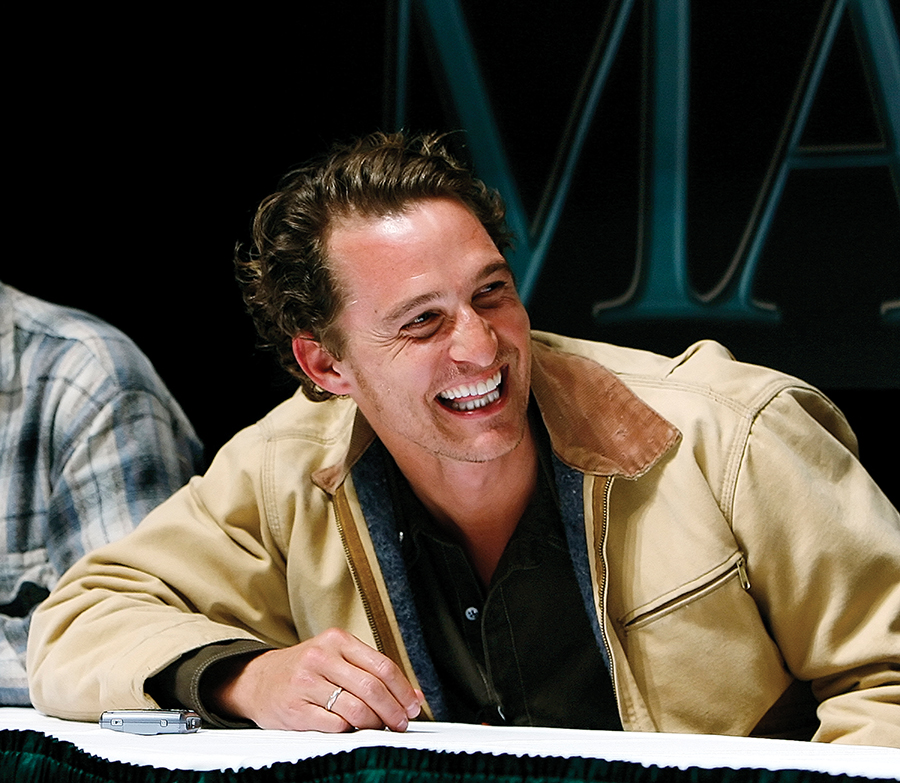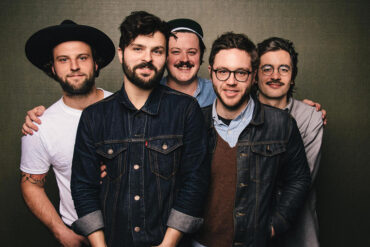By Dr, Ralph J. Turner
HQ 60 | WINTER 2007
Movie making is, indeed, big business, but something unusual happened in making We Are Marshall. It very quickly became more than just another film. A “love affair” developed between the Warner Bros. movie-makers and the people of Marshall University and Huntington.
Marshall had been contacted many times over the years by filmmakers interested in capturing the Marshall story about the Nov. 14, 1970, plane crash and resurgence of the football program and community. But Dr. Keith Spears, vice president of marketing and communications for the university, said none of the proposals seemed appropriate until Warner Bros. representatives showed up with not only ideas, but a script and the financial resources to produce a quality movie worthy of the Marshall story.
Before filming began, an anonymous letter was found in Spring Hill Cemetery at the memorial site for crash victims. The note was shown to the movie cast and crew. This set the tone for all that was to follow in filming the story of a university and community recovering from the worst tragedy in the history of college athletics.
That note is described by those who have seen it as well written with advice for the movie-makers to respect the sensitivity of the subject matter and to protect the feelings of the family survivors of those who died that rainy November night.
Dr. Corley Dennison, dean of the Marshall University School of Journalism & Mass Communications, said a number of factors were involved in the development of the excellent relationship between motion picture executives and the Marshall community.
“Director McG, Producer Basil Iwanyk and the movie writers were very sympathetic to Marshall and Huntington,” Dennison said. “They recognized a great untold story was here that went beyond football.
“The revival of the football program is a tribute to the men and women of Marshall and the citizens of Huntington who endured deep tragedy and then rebuilt a championship program in memory of those who were lost.”
Dennison said a lot of credit has to go to Keith Spears as well. “Keith wasn’t ready to let the story go to Hollywood until he was sure that he had the people who wanted to tell the real story.”
The Warner Bros. cast and crew quickly learned Huntington was not going to be the typical movie-making location.
A crowd estimated at 10,000 jammed Fourth Avenue between Ninth and Tenth streets for a block party Saturday, April 1, before filming started. They came to see stars Matthew McConaughey and David Strathairn as well as Director Joseph McGinty Nichol, usually credited as McG.
They addressed the crowd from a portable stage in front of the Keith-Albee Theatre. Minutes earlier, a press conference had ended. Fifty-five members of the news media, local and national, showed up for the event inside the theatre.
It was an electrifying scene. People filled the avenue to overflow in front of the stage outside the Keith-Albee Theatre.
McConaughey, some crew and cast members as well as some local people gathered for dinner at the Marshall Hall of Fame Cafe after the block party. According to one news report, the star asked, “Is Huntington always this crazy with excitement?”
“No. This is a special moment in time,” was the response from one local fan.
But this was only the beginning of three unusual weeks of movie-making in Huntington.
Twelve hundred people, mainly students, responded to a casting call to show up at Buskirk Field on campus for filming a major scene. The crowd was dressed in 1970s clothing and shouted “We Are … Marshall” over and over through numerous film takes. In the scene, school officials are meeting inside Morrow Library in space converted to a boardroom to decide the future of the football program.
At another shoot, an estimated crowd of 5,000 overflowed Memorial Student Plaza in a scene featuring the turning on of the Memorial Fountain. Not only students and townspeople were there, but many drove to campus from several states to be part of the scene.
McG called the turnout and crowd participation the best response he had ever experienced in his filming career.

Before all the movie-makers left town there was one more event – the Green-White scrimmage game at Joan C. Edwards Stadium Saturday, April 22. A crowd record for a scrimmage was set as 17,000-plus filled the west side of the stadium. This was not as much a scene shot, but a culmination and celebration of three weeks of filming in Huntington.
And what a show it was.
There was the 2006 football team, a reunion of the 1996 1-AA national championship team that went 15-0 and, of course, stars from the upcoming We Are Marshall motion picture.
Former Marshall stars and now NFL players Randy Moss and Chad Pennington were honorary coaches of the two teams along with actors Matthew McConaughey and David Strathairn. They were all introduced to thunderous roars from the crowd.
During a break in the game, McG grabbed Moss, Pennington and actor Matthew McConaughey and led the crowd in a “We Are …Marshall” cheer. The sound was deafening as Warner Bros. film crews captured the moment.
At halftime, McG kicked field goals of 25, 30 and 35 yards, with each successful try resulting in a donation to Marshall University. He ended up giving $20,000 to the school.
Bob Hardwick, an executive vice president with First Sentry Bank and lifelong Huntington resident, captured it in these words: “For me personally, today had to be one of the most special days in the history of Huntington. The atmosphere was electric. The town really seemed united. The cast and crew from the film appeared grateful and moved. As the game played to a close, McConaughey addressed the crowd and thanked everyone in Huntington for their hospitality and promised to return for the premiere of the film. He then ran off the field holding up the number one finger as fans cheered.”
It seemed as if everyone in the stands had cameras – attempting to record another of those “special moments.”
Vice President Spears provided more insight as to what happened in the Huntington community those three weeks last April.
“Whenever a film crew gets together, there has to be a bonding – a general understanding of how they will work together. The We Are Marshall crew did this in Huntington and, in effect, bonded with the Huntington community as well. Many of the crew members spoke to me about how wonderful Huntington was to them. Of course, we in Huntington saw them in the same light.”
Dr. Spears also spoke about why filming in Huntington was special in other ways.
“When the crew was in Huntington every member was a celebrity, even the cable pullers.”
Dr. Spears said when they were in Atlanta for filming they were considered in the way by some there.
Spears said actor David Strathairn, who plays MU President Donald Dedmon at the time of the crash, remarked after seeing some rough cuts of the movie, “I know that we did some good things, but I didn’t realize that it was this good.”
Dr. Spears said some of the upper level executives at Warner Bros. have told him the movie project took on a life of its own. “It has something spiritual about it. I am so pleased that this film has become what we always thought that it could be. It tells the Marshall family’s story so well.”
McG often told crowds in the hundreds and thousands gathered to watch or participate in the filming how special the experience was for the cast and crews – about 150 – who came to town from Hollywood and elsewhere.
Ernie Malik, unit publicist for the movie, said about the block party, “I didn’t know what to expect because I’d never been to anything like that. It was amazing. They really wanted to see the stars because they hadn’t had a movie made in their town before.

“McG was like a cheerleader. He’s soulful, smart and caring. When we walked out of the theater from the news conference that day we were surrounded. Then, McG took the bull by the horns and really got them juiced up – as if they weren’t excited before. Even David Strathairn got into it and he’s a pretty calm man. Once the cast and crew got here they felt what the story means to this community.”
He said everyone knew the studio didn’t need permission to make this film, but they did need approval to shoot on the Marshall campus. “What they wanted beyond that approval was the blessing of the university and the city. Once they got that they didn’t want to let anybody down.”
It seemed as if everyone involved – cast and crew – went out of their way daily to praise the community about how well they were treated wherever they went.
McG and McConaughey, star of the film who plays former Marshall Coach Jack Lengyel, returned to town to attend the MU vs. University of Central Florida game Oct. 4.
“Thank you for having us back,” McConaughey shouted to the crowd during halftime. “We were here shooting for a month and got to know some of you well, got to say hello to most of you and waved at everyone at least once.”
He introduced a scene from the movie before it flashed upon the big screen at the football stadium.
“The scene you are going to see has a lot to do with where we are today. The program would not have stayed alive 36 years ago if you as a community hadn’t come together then, dug deep and supported each other. Nobody would be here right now,” McConaughey said.
Chad Cork, an assistant director of casting, in an interview from his Mar Vista, Calif., home said, “By far – hands down – it has been an incredible experience working on this movie in Huntington. From the time we arrived there was such graciousness and helpfulness shown by the people in the community.
“It was a cool experience. Many of our crew members expressed similar feelings toward the people of Huntington and Marshall.”
He praised Dr. Spears for being a great liaison between the university and movie-makers. He said the turnout for extras was 10 times better than filming in Atlanta where the crew moved after three weeks in Huntington.
Jeanie Poindexter of Huntington got to know some of the cast and crew when she was hired to help with the craft food service.
“The crew and cast members were very positive about the Huntington experience,” she said. “Crew members really felt welcomed and appreciated. When filming ended, I attended a wrap party, and people from the crew kept telling me they didn’t want to leave Huntington because they loved it here. Most of them were not looking forward to going to Atlanta or returning to Hollywood.”
Iwanyk, the film’s producer, agreed. “We were all depressed when it was time to leave Huntington and go to Atlanta. We were treated so well and people were so friendly and nice and solicitous. People were coming up to us all the time to thank us, and that’s not something that usually happens in the movie- making business. I made some true friends in Huntington.
“There’s a subtle elegance to many of the people in Huntington. One thing I’ve learned about that area, and West Virginia as a whole, is there is southern-type hospitality in how they carry themselves and their politeness. They are the kind of people who look you in the eye and are truly generous – whether they are inviting you over for dinner or making sure you feel comfortable. That meant a lot to me.”
McG echoed those sentiments. “I just can’t tell you how much the warmness and kindness of this community means to me, which I believe you will see reflected on the screen,” he said after being inducted into the Marshall Business Hall of Fame. “I was touched by the strength and spirit of this community – the beauty of good people. It’s affected my life tremendously.”

Red Dawson, an assistant Marshall football coach before and after the crash, is portrayed by Matthew Fox, one of the major actors in the film. Dawson heaped praise upon the movie cast and crew.
“There is no question about the love affair with Huntington and Warner Bros. because they have tried to do a quality movie and they have been very sensitive about families closely involved,” Dawson said.
“I had never been around movie-making before. I have heard that films based on true stories are often disappointing to the people being portrayed. But, I believe McG and his crew tried to cover everybody and tell the true story. It was ‘Hollywooded up’ a bit, but basically it is a tremendous story to tell and they didn’t need to change much.”
He called McG “a super guy” and provided an example to illustrate his positive feelings toward the cast and crew.
“It’s both the big and little things they did,” he said. “When they were filming in Atlanta and I was playing the role of the Morehead State coach, I told them I had to leave town the following day to return to Huntington. It was 4 a.m. in the morning. Everyone was ready to break and go home. McG announced that I had to leave, and they needed to finish filming my scene. He asked if anybody had a problem with that. No one said anything, and we went back to work. That says something about him right there. That impressed me.”
Lucy Kautz of Huntington, widow of MU Athletic Director Charles Kautz who died in the plane crash, said, “Although I have had reservations all these years about how a movie might treat our sorrow, I understand it will be a wonderful movie based on what I know. My husband loved Marshall, and he would have been pleased with how this movie might help the university.”
Her daughter, Lucianne Kautz Call of Barboursville, a Marshall cheerleader from 1967-1970, said, “I have been very pleased. I have not one bad thing to say about the movie and the people who made it. The movie people have become Marshall fans. They’re part of the Marshall family now.”
David Wellman, director of communications at Marshall, praised the movie executives. “When I think of this movie, I think of four behind the scenes people first – producers Basil Iwanyk and Mary Viola, script writer Jamie Linden and director McG. They’re all young, energetic and hard-working, and they treated our communications staff at Marshall with respect and genuine friendliness, from their first day in Huntington to the last. When we offered advice on anything relating to the story they were attempting to tell, they listened closely and took it to heart.
“It seemed to me every member of the movie crew, from actors to the cable carriers, enjoyed their three-week stay in Huntington in April, and their scouting visits that preceded the start of filming. I think all of Marshall and the Huntington community should be proud of that.”
Huntington Mayor David Felinton said he spent a day at a filming site and was impressed with what he saw. “More than half the crew had something Marshall on – a hat or T-shirt. I heard frequently how much they liked making the movie and being in Huntington. We were so excited about the movie and the great impact it would have that nobody in town really minded street closings to make way for shooting the film.”
Hollywood came to Huntington and was welcomed with open arms and open hearts. The movie-makers promised to be sensitive to local concerns and, from all accounts, certainly kept their word.
Now the Hollywood folks are gone. There are no longer cameras on booms or McG shouting, “take two” or “that’s a wrap.” The big trucks loaded with lighting, sound and camera equipment have long since packed up and returned to Atlanta and elsewhere.
Many of the filmmakers said they had developed friendships – even perhaps lifelong ones – with those they call the “friendly, gracious” people of Huntington and Marshall University.
The people of Huntington expressed similar affection for the movie folks.
“ I feel like Matthew Fox is a friend rather than a movie star,” Red Dawson said about the actor who portrays him in the movie. “He’s just down to earth. I hope to go fishing with him next year in Wyoming.”
The We Are Marshall movie stars and many crew members have indicated they will be back at least one more time for the movie premiere in December.
From in front of the movie cameras hundreds shouted “We Are … Marshall” for the film. And those who got to know the movie-makers intimately say, “They Are Marshall, too.”





